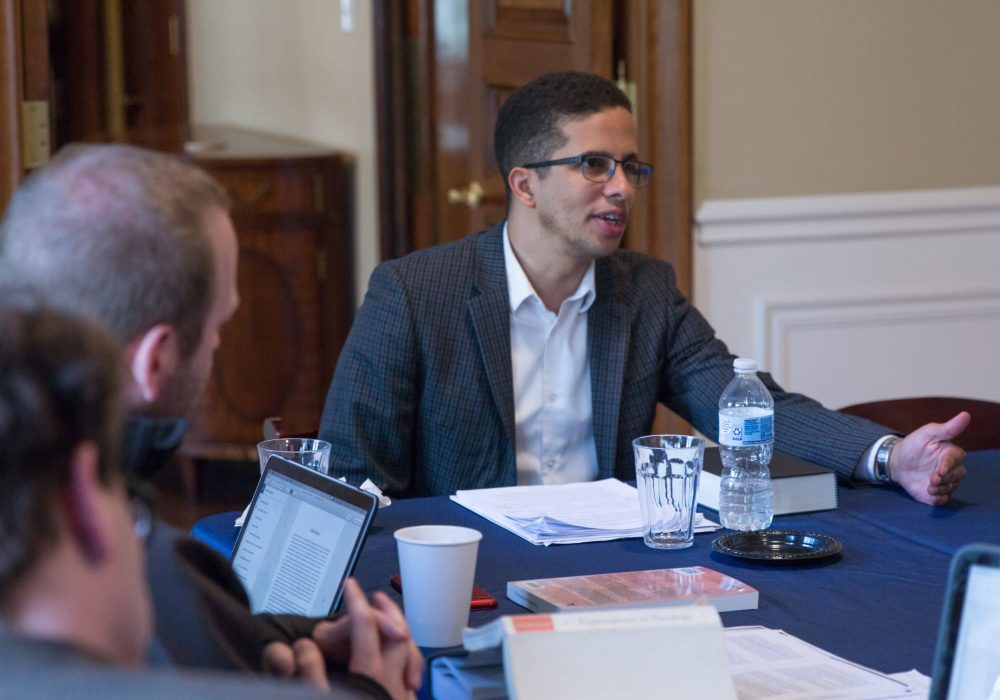To view photos of the master class, visit Lumen Christi’s Facebook page.
Open to current students and faculty. Copies of the readings will be provided for registrants.
Hans Urs von Balthasar (1905–1988) was one of the most prolific and controversial Catholic theologians of the twentieth century. Responses to his work have ranged from the effusive to the dismissive. Instead of favoring any such one-sided judgments, however, I invite participants in this seminar to focus on two tasks that require considerably more scholarly effort. First, there is the task simply of understanding Balthasar—that is, making sense of his claims, their historical and intellectual contexts, the arguments that he offers in support of them, the style in which he expresses them, and the current debates surrounding them. Second, there is the task of evaluating his work—that is, clarifying what critiques may be warranted within the space of a sufficiently charitable interpretation and what positions theologians attuned to contemporary needs and realities ought to take on various aspects of his thought.
In particular, this seminar considers Balthasar in connection with the Christian tradition of mystical theology. Like many great figures in this tradition, Balthasar believes that theology and sanctity, thought and prayer, contemplation and action, knowledge and love ought to go together. As a mystical theologian, he is not content merely to comment on Christian doctrine (though it remains absolutely essential). He seeks to clarify the conditions under which the creature can be drawn into union with God through Christ and the Holy Spirit. He is interested as much in the lived experience of grace as in its theorization. The first part of the seminar offers some important context for understanding Balthasar (with help from Peter Henrici, S.J.) and highlights Balthasar’s famous essay, “Theology and Sanctity,” which offers a more or less adequate snapshot of his mystical theology. The second part of the seminar delves a bit deeper to study his complex genealogical arguments in the section of The Glory of the Lord, volume 5, called “The Metaphysics of the Saints.” Here Balthasar both exposes the mystical theological roots of certain modern conceptual and practical maladies and attempts to identify their mystical theological antidotes.
The recommended readings may be helpful to seminar participants who are interested in the question of Balthasar’s gender essentialism (see Corinne Crammer’s “One Sex or Two?”) or in the ecumenical potential of Balthasar’s mystical theology in the midst of debates between Karl Barth and Erich Pryzwara, and their intellectual descendants, about the analogia entis (see my “Dialectic and Analogy”).
REQUIRED READINGS
For session 1:
Henrici, Peter, S.J. “Hans Urs von Balthasar: A Sketch of His Life.” In Hans Urs von Balthasar: His Life and Work. Edited by David L. Schindler. San Francisco: Ignatius Press, 1991. 7–43.
Balthasar, Hans Urs von. “Theology and Sanctity.” In Explorations in Theology, volume 1, The Word Made Flesh. San Francisco: Ignatius Press, 1989. 181–209.
For session 2:
Balthasar, Hans Urs von. “The Metaphysics of the Saints.” In The Glory of the Lord: A Theological Aesthetics, volume 5, The Realm of Metaphysics in the Modern Age. Translated by Oliver Davies, et al. San Francisco: Ignatius Press, 1991. 48–140.
SUGGESTED READINGS
Crammer, Corinne. “One Sex or Two? Balthasar’s Theology of the Sexes.” In The Cambridge Companion to Hans Urs von Balthasar. Edited by Edward Oakes, S.J. and David Moss. New York: Cambridge University Press, 2004. 93–112.
Prevot, Andrew. “Dialectic and Analogy in Balthasar’s ‘The Metaphysics of the Saints.’” Pro Ecclesia: A Journal of Catholic and Evangelical Theology 26, no. 3 (Summer 2017): 261–77.
Andrew Prevot also gave a lecture on The Hope of Exodus in Black Theology on May 9.

